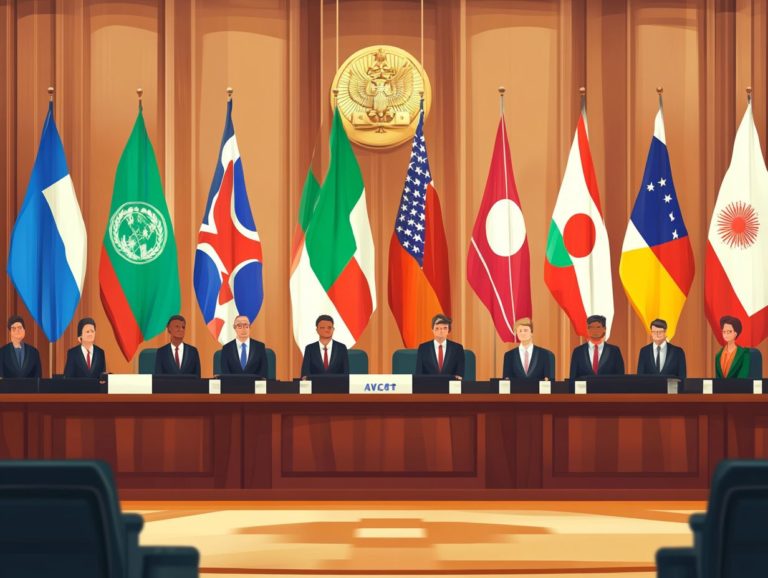The Role of WIPO in International IP Law
In an increasingly interconnected world, safeguarding intellectual property (IP) has become crucial for nurturing innovation and driving economic growth.
Dive into the exciting history of WIPO and see how it shapes the future of innovation!
The World Intellectual Property Organization (WIPO) serves as a cornerstone in shaping international IP law, ensuring that creators and inventors receive the recognition and rewards they deserve for their contributions.
This article delves into the fascinating history and evolution of WIPO, outlining its key treaties and agreements while highlighting the organization s relentless efforts to protect IP rights on a global scale.
You will discover the significant impact WIPO has on innovation, explore inspiring success stories, and reflect on the challenges that lie ahead.
Embark on this journey as you navigate the complexities of international IP law and uncover WIPO’s essential role in its advancement.
Contents
- Key Takeaways:
- The Journey of WIPO: Protecting Innovation Since 1883
- WIPO’s Role in Protecting Intellectual Property
- WIPO Treaties and Agreements
- WIPO’s Impact on Global Innovation and Development
- Future of WIPO and International IP Law
- Frequently Asked Questions
- What is the role of WIPO in International IP Law?
- How does WIPO help protect intellectual property rights globally?
- What is the significance of WIPO’s role in international IP law?
- Is membership in WIPO mandatory for countries?
- Can individuals and businesses directly register their intellectual property with WIPO?
- How can individuals and businesses access WIPO’s resources and services?
Key Takeaways:

- WIPO is a specialized agency of the United Nations that promotes the protection of intellectual property (IP) rights worldwide.
- Since its establishment in 1967, WIPO has played a crucial role in shaping and enforcing international IP laws through treaties and agreements.
- WIPO’s efforts have significantly impacted global innovation and development by providing a framework for the protection and enforcement of IP rights.
Overview of WIPO and its Purpose
The World Intellectual Property Organization (WIPO), headquartered in Geneva, Switzerland, is a distinguished agency of the United Nations dedicated to nurturing creativity and innovation by safeguarding intellectual property (IP) rights.
It functions as a global platform for discussing and coordinating international agreements that govern patents, copyrights, trademarks, and other forms of legal protection for creative endeavors. This ensures that you can earn money from your work while also serving the public interest.
WIPO’s goals encompass making the legal frameworks surrounding these rights both accessible and equitable. It aims to foster an ecosystem where inventors and artists can truly flourish. By promoting collaboration among nations, it enhances transparency and streamlines processes, ultimately acting as a catalyst for economic growth.
The organization understands that robust IP protections not only ignite individual creativity but also play a pivotal role in societal progress, enabling communities to share in the fruits of innovation.
WIPO runs programs to educate people about the importance of IP, cultivating a more informed society that values and respects the contributions of creators like you.
The Journey of WIPO: Protecting Innovation Since 1883
The history and evolution of the World Intellectual Property Organization (WIPO) reflect a dedicated global initiative to create a unified framework for the protection of intellectual property rights among nations.
This journey can be traced back to the Paris Convention of 1883, marking the beginning of a concerted effort to safeguard these rights on an international scale.
Key Milestones and Changes in International IP Law
Key milestones in international IP law are essential touchpoints in the evolution of intellectual property, including significant treaties and agreements that have profoundly influenced the landscape.
Among these are the establishment of the Patent Cooperation Treaty (PCT) and the Berne Convention for the Protection of Literary and Artistic Works. These foundational agreements have set critical standards for the protection and enforcement of rights concerning inventions, creative works, and brand identities across borders.
For instance, the PCT has streamlined the patent filing process, allowing innovators like you to secure protection for your inventions in multiple jurisdictions with remarkable ease. Similarly, the Berne Convention provides a robust framework for copyright protection that transcends national boundaries, ensuring that authors and artists obtain the recognition and remuneration they deserve for their creations on a global scale.
Such milestones not only enhance legal clarity but also foster a more cohesive international approach to IP protection, ultimately stimulating innovation and creativity across various industries.
Join the movement to protect creativity and explore how you can benefit from WIPO s resources today!
WIPO’s Role in Protecting Intellectual Property

WIPO is essential for safeguarding intellectual property. It offers a strong framework for enforcing IP rights globally.
This allows creators to protect their innovations and thrive in a secure environment.
Enforcement and Implementation of IP Rights
Enforcing intellectual property rights is crucial for creators. These rights provide essential legal protections against unauthorized use of your works.
Without these safeguards, you might hesitate to share your groundbreaking ideas. Fear of theft could stifle your creativity and hinder economic growth.
International agreements like the Agreement on Trade-Related Aspects of Intellectual Property Rights (TRIPS) create similar protection levels in different countries. National laws also provide tailored enforcement mechanisms for local challenges.
However, obstacles like differing legal standards and complexities of the digital landscape can complicate enforcement. It is crucial for stakeholders to advocate for strong legal frameworks that support innovation and combat infringement through collaboration and education.
WIPO Treaties and Agreements
WIPO’s treaties and agreements are the cornerstone of international IP law. They set the standards for protecting patents, copyrights, and trademarks among member states.
This framework fosters a cohesive global approach to intellectual property rights. It enhances the system’s integrity, ensuring your innovations are safeguarded across borders.
Key Agreements and Their Impact on International IP Law
Key agreements facilitated by WIPO, such as the Madrid Protocol and the Hague Agreement, significantly impact international IP law. They streamline the process of obtaining protection for intellectual property rights across multiple jurisdictions.
These frameworks cut through the complexities of international registration. They simplify the path for you as a creator to secure your innovations globally.
By reducing administrative burdens and costs, they create a more accessible environment for seeking financial returns on artistic and inventive pursuits. Consequently, both individuals and businesses enhance their marketability and competitiveness, fostering a culture of creativity and innovation.
This contributes significantly to economic growth and diversification in our interconnected world.
WIPO’s Impact on Global Innovation and Development

WIPO is a game-changer for global innovation and development! It establishes a robust framework for protecting intellectual property rights.
It goes beyond protection; it actively promotes sustainable goals and fosters economic development, especially in developing and least-developed countries.
This dual approach safeguards creativity and helps nations thrive in an increasingly interconnected world.
Success Stories and Challenges
WIPO’s journey is a tapestry woven with success stories that highlight the transformative power of intellectual property (IP) the legal rights that protect creations of the mind in fostering innovation and creativity. It also faces challenges, particularly in ensuring equitable access to IP protections for all nations.
One compelling example is the collaboration between WIPO and various startups in developing countries. These partnerships have resulted in groundbreaking advancements in sustainable technologies. They not only nurture local entrepreneurship but also tackle global issues, such as climate change.
However, the organization must navigate the delicate balance between promoting these innovations and ensuring environmental responsibility. This involves grappling with complex international laws on intellectual property that can sometimes obstruct equitable access for developing nations.
By confronting these multifaceted challenges head-on, WIPO is determined to create an inclusive environment for all innovators, ultimately enriching the global landscape of creativity and sustainability.
Future of WIPO and International IP Law
The future of WIPO and international IP law is on the brink of transformation, spurred by swift technological advancements and the dynamic nature of global commerce. This evolution will require a reassessment of existing frameworks to ensure they effectively serve both creators and the public interest.
Predictions and Potential Changes
WIPO is on the verge of crucial adaptations to meet the demands of emerging technologies like artificial intelligence (AI) technology that allows machines to learn from data and blockchain, significantly reshaping the landscape of international IP law.
As these technologies continue to evolve, it s likely that WIPO will focus on crafting policies that strike a balance between the rights of creators and the pressing needs of society.
For instance, creators using AI may grapple with challenges in defining ownership over works generated by machine learning algorithms. Clearer guidelines would be beneficial, ensuring that businesses can protect their innovations while nurturing an environment ripe for collaboration and competition.
Furthermore, the dynamic world of digital currency and smart contracts within the blockchain space raises crucial questions about enforcing IP rights. Such adaptations could ultimately enable innovators and businesses worldwide while considering the public interest through equitable access and the sharing of information.
Frequently Asked Questions
Here are some common questions about WIPO and its role in international IP law:
What is the role of WIPO in International IP Law?
WIPO, or the World Intellectual Property Organization, is a specialized agency of the United Nations that aims to promote and protect intellectual property rights on an international level. Its role in international IP law is to establish global IP standards, facilitate cooperation among member states, and provide services and resources for the protection of IP rights.
How does WIPO help protect intellectual property rights globally?
WIPO works to protect IP rights globally by providing a forum for member states to negotiate and implement international IP agreements, such as the Paris Convention for the Protection of Industrial Property and the Berne Convention for the Protection of Literary and Artistic Works. It also offers various services and resources, such as the WIPO Arbitration and Mediation Center, to help resolve IP disputes.
What is the significance of WIPO’s role in international IP law?
WIPO’s role in international IP law is crucial as it helps create a harmonized and balanced global IP framework that benefits creators, inventors, and businesses. For deeper insights, consider understanding the role of IP lawyers in international cases. It also promotes innovation and creativity by protecting and encouraging the use of intellectual property.
Is membership in WIPO mandatory for countries?
No, membership in WIPO is voluntary and currently consists of 193 member states. However, most countries choose to join WIPO to take advantage of its services and resources, as well as participate in shaping international IP policies and agreements.
Can individuals and businesses directly register their intellectual property with WIPO?
No, WIPO does not directly register or grant IP rights. These tasks are typically handled by national IP offices in each country. However, WIPO does provide a central repository for IP information and maintains a database of national IP laws and regulations.
How can individuals and businesses access WIPO’s resources and services?
Individuals and businesses can access the World Intellectual Property Organization’s resources by becoming a member or through their national IP offices, which often belong to WIPO.
WIPO offers various online tools, like the Global Brand Database and the Madrid System for registering trademarks. Anyone with internet access can use these tools. Don t miss out on these valuable resources!







